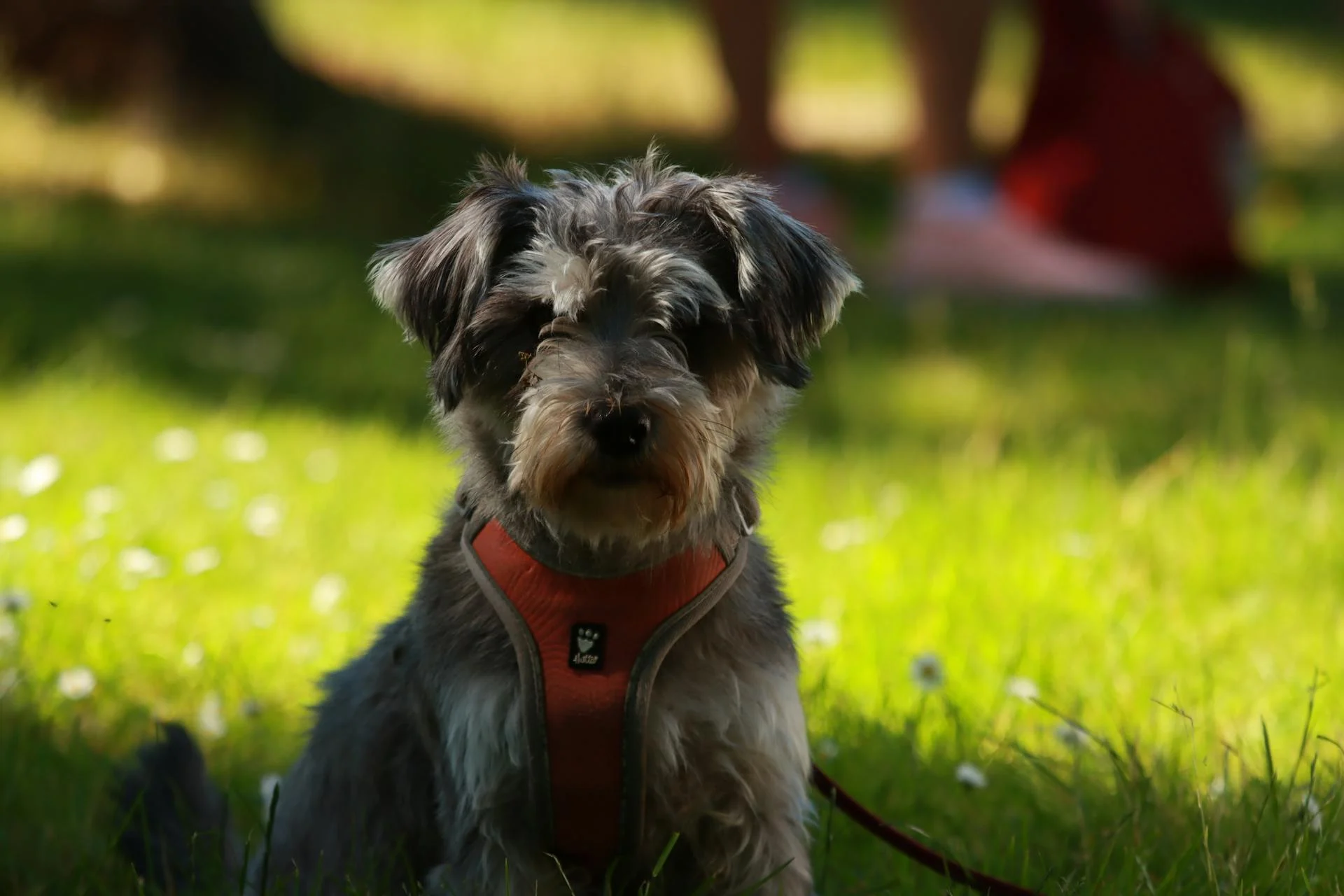
Training a miniature schnauzer not to bark requires patience and consistency. Consistency is key, as miniature schnauzers are intelligent and thrive on routine.
To establish a quiet environment, start by setting aside a designated quiet time each day. This can be as simple as taking a 30-minute walk without talking or engaging in loud activities.
Miniature schnauzers are naturally alert dogs and may bark at strangers, other animals, or unusual noises. They can also bark due to boredom or lack of exercise.
Establishing a daily exercise routine can help reduce barking caused by excess energy. Aim for at least 30 minutes of physical activity and mental stimulation daily.
Preparation
Before you start training your Miniature Schnauzer, it's essential to learn about their temperament and training needs. Research their energy levels, intelligence, and any breed-specific quirks.
Miniature Schnauzers are intelligent dogs that require consistent training. Understanding their breed-specific traits will help you tailor your approach to their unique needs.
Check this out: Miniature Schnauzer Dog Breed Profile
Designate a specific area in your home or yard as a training space, and make sure it's off-limits when you're training to minimize distractions. This will help your dog focus on the training.
Remove any distractions from the training space, such as toys or other pets, to ensure your Miniature Schnauzer can concentrate on the training. A safe and comfortable environment is crucial for effective training.
Stock up on healthy treats and a clicker, if you choose to use one, to help reinforce good behavior and mark desired actions.
Understanding Barking Behavior
Understanding barking behavior is key to addressing excessive barking in Miniature Schnauzers. Factors such as a lack of socialization can lead to anxiety or overreactivity, causing heightened barking.
Their natural instinct to bark can be triggered by external stimuli like the doorbell ringing or passing cars. Recognizing these triggers is essential to modifying their response.
To foster a happy and content canine companion, it's crucial to set realistic expectations and understand that barking is part of their nature. Regular exercise and mental stimulation, along with addressing grooming and health considerations, contribute to a balanced and well-behaved Miniature Schnauzer.
Miniature Schnauzers
Miniature Schnauzers are renowned for their distinctive appearance, characterized by their bushy eyebrows, bristly mustaches, and wiry coats.
Their charming exterior belies a crucial aspect of their nature: understanding their barking tendencies is essential.
Miniature Schnauzers have a reputation for being vocal dogs, and their barking is often a result of their instinct to alert and protect their family.
A key factor in their barking behavior is their high energy level, which can be met with regular exercise and mental stimulation.
Their intelligence and trainability make them responsive to training, but consistent effort is necessary to address excessive barking.
Their strong loyalty to their family can sometimes lead to protective barking, especially around strangers or other animals.
Social Nature
Miniature Schnauzers are social creatures that thrive on companionship and interaction with their human family members. They may resort to barking as a means of expressing their loneliness or seeking attention when left alone for extended periods.
Their social nature is a key factor in understanding their barking behavior, and it's essential to provide them with the attention and interaction they crave. Regular play sessions and interactive dog toys can help satisfy their need for socialization and reduce excessive barking.
As social animals, Miniature Schnauzers are highly attuned to their environment and can pick up on subtle cues from their owners. They may bark to initiate play or to get attention, so it's crucial to be aware of their body language and respond accordingly.
By recognizing and addressing their social needs, you can help reduce excessive barking and strengthen your bond with your Miniature Schnauzer.
Grooming and Behavior
Regular grooming sessions are essential for Miniature Schnauzers, as they contribute to their overall comfort and reduce the likelihood of discomfort-related barking. A well-groomed Miniature Schnauzer is less likely to exhibit this behavior.
Engaging in regular brushing of their distinctive double coat and keeping their facial hair tidy is key to their comfort. This simple habit can make a big difference in their barking tendencies.
Maintaining their health is integral to managing their barking tendencies, and grooming plays a significant role in this process. By prioritizing their grooming needs, you can help ensure they stay happy and quiet.
Regular grooming sessions, including brushing and keeping their facial hair tidy, can help reduce barking caused by discomfort. This is a simple yet effective way to promote a more relaxed and calm demeanor in your Miniature Schnauzer.
Check this out: Giant Schnauzer Grooming Styles
Health Issues Leading to Excess
Regular veterinary check-ups are essential to identify potential health concerns early on, preventing unnecessary barking caused by discomfort.
Certain health problems, such as dental issues or joint pain, can contribute to increased barking, making it crucial to keep a close eye on your furry friend's health.
Dental issues, for instance, can cause pain and discomfort, leading to excessive barking.
Joint pain, on the other hand, can make your dog uncomfortable, resulting in increased vocalization.
By addressing these health issues promptly, you can help reduce excessive barking and ensure your dog's overall well-being.
Take a look at this: Giant Schnauzer Health Problems
Reducing Excessive Barking
Removing the motivation to bark is key. Figure out what your Miniature Schnauzer gets out of barking and work to remove it.
Regular veterinary check-ups can help identify potential health concerns that may be contributing to excessive barking. This can include dental issues or joint pain.
To differentiate between normal alert barking and excessive barking, understand the context of your dog's barking. This will help you identify whether it's a response to a perceived threat or a behavior that needs modification.
A tired dog is a happy dog, and a tired dog is less likely to bark from boredom or frustration. Make sure your Miniature Schnauzer is getting sufficient physical and mental exercise every day.
Preventing barking is easier than trying to stop it once it's started. Keeping your dog busy and exercised will help reduce barking and prevent them from practicing it.
If your Miniature Schnauzer barks when confined, try the following:
- Wait until they've stopped barking before letting them out of their crate or gated room.
- Reward them with a treat or a puzzle toy after they've been quiet for a short period.
- Vary the amount of time they must remain quiet before being rewarded, to keep it fun and engaging.
By following these tips, you can help reduce your Miniature Schnauzer's excessive barking and create a happier, healthier relationship with your furry friend.
Training Strategies
Implementing effective strategies is key to training a Miniature Schnauzer not to bark. Successful outcomes often involve a combination of training techniques, environmental modifications, and patience.
Positive reinforcement is highly effective with Miniature Schnauzers. Rewarding them with treats or praise when they exhibit desired behavior reinforces the idea that not barking is a positive action.
Desensitize your dog to the stimulus by starting at a distance and gradually increasing proximity. Feed them treats for maintaining eye contact with you and not barking.
Check this out: Training Dog Not to Bark at Doorbell
Consistency in Commands
Consistency in Commands is crucial when training your Miniature Schnauzer. Clear and consistent commands reduce confusion and reinforce the desired behavior.
Using the same command for quietness every time is essential. Consistency helps your dog understand what you want them to do.
In any dog training, consistency is key. Consistency in commands is no exception for Miniature Schnauzers. Using clear, consistent commands for quietness and enforcing them every time reduces confusion and reinforces the desired behavior.
Broaden your view: Miniature Schnauzer Behavior Problems
To achieve consistency, use a specific command, such as "Quiet", and use it every time your dog starts barking. This helps your dog associate the command with the desired behavior.
By being consistent, you'll see improvement in your dog's understanding of what you want them to do. Consistency helps your dog learn faster and reduces frustration for both you and your dog.
Here's a simple approach to consistency in commands:
Consistency in commands is an ongoing process. Keep working with your dog, and you'll see improvements over time.
Exercise and Stimulation
Regular exercise is essential for Miniature Schnauzers, as it can significantly impact their barking behavior.
Physical activity helps to burn off excess energy, which can contribute to barking. Keeping them physically active is paramount for their well-being.
Mental stimulation is just as important as physical exercise, and it can be achieved through interactive toys and puzzle games.
Engaging your Miniature Schnauzer's mind can help to reduce barking by providing a healthy outlet for their natural curiosity.
Effective Training
Seeking professional assistance from dog trainers or behaviorists can provide tailored strategies and insights to help you curb excessive barking in your Miniature Schnauzer.
Implementing effective training strategies is key to a successful outcome. Successful outcomes in case studies often involve a combination of training techniques, environmental modifications, and patience.
Positive reinforcement is a powerful tool in training your Miniature Schnauzer. Owners share their journeys of implementing positive reinforcement, consistent commands, and, in some cases, seeking professional guidance.
Professional guidance ensures a customized approach that suits the individual needs and personality of your Miniature Schnauzer. This is especially helpful for owners facing challenges in curbing excessive barking.
Consistency is crucial in training your Miniature Schnauzer. Implementing consistent commands and positive reinforcement can lead to a significant reduction in barking.
Patience is also essential in training your Miniature Schnauzer. Successful outcomes often involve patience and a willingness to try different approaches until you find what works best for your dog.
Seeking Help and Support
If you're struggling to train your Miniature Schnauzer not to bark, don't worry, you're not alone. Professional dog behaviorists possess the expertise to analyze and understand the root causes of behavioral issues.
Seeking help from a certified professional dog trainer can also be a great option, especially if your dog is barking reactively to strangers, family members, or other dogs. They can provide you with tailored training plans to address specific concerns.
Professional guidance from trainers or behaviorists ensures a customized approach that suits the individual needs and personality of your Miniature Schnauzer.
Worth a look: How to Train Your Dog Not to Bark at Strangers?
Certified Professional Contact
If you're struggling to address your Miniature Schnauzer's excessive barking, don't hesitate to seek help from a certified professional dog trainer.
Reaching out to a certified professional dog trainer can be a game-changer for addressing reactive barking issues.
They can provide tailored strategies and insights to help you and your dog overcome these challenges.
For owners facing challenges in curbing excessive barking, seeking professional assistance from dog trainers or behaviorists can provide tailored strategies and insights.
Professional guidance ensures a customized approach that suits the individual needs and personality of the Miniature Schnauzer.
Contacting a certified professional dog trainer is a great option if the above tips prove unsuccessful in addressing your dog's barking issues.
When to Consult a Vet

If you notice sudden changes in your dog's behavior, including excessive barking, it's essential to consult a veterinarian.
Underlying health issues, such as pain or discomfort, can manifest through changes in behavior, including barking.
A vet can conduct thorough examinations and diagnostics to rule out health-related causes.
If your dog's barking is accompanied by other behavioral changes, it's crucial to consult a veterinarian to determine the underlying cause.
Sources
- https://www.dogster.com/dog-training/how-to-train-a-miniature-schnauzer
- https://www.humanesociety.org/resources/how-get-your-dog-stop-barking
- https://blog.tryfi.com/do-miniature-schnauzers-bark-a-lot/
- https://wagwalking.com/training/train-a-miniature-schnauzer-to-stop-barking
- https://www.schnauzerpeople.com/how-to-stop-your-schnauzer-from-excessive-barking/
Featured Images: pexels.com


